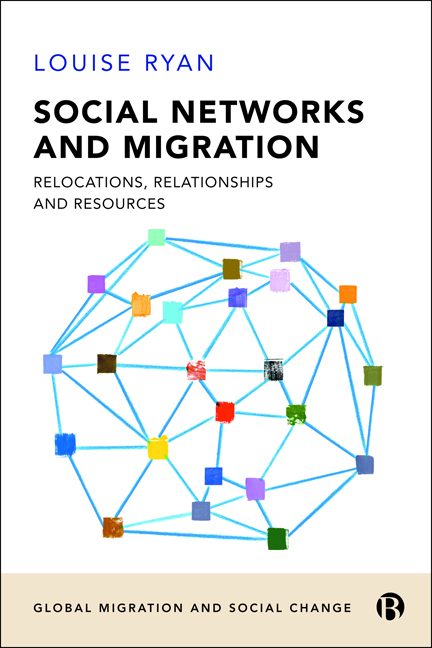Book contents
- Frontmatter
- Contents
- List of Figures
- About the Author
- Acknowledgements
- 1 Introduction: Embarking on a Book about Networks
- 2 Conceptualising Migrant Networks: Advancing the Field of Qualitative Social Network Analysis
- 3 Researching Migration and Networks: Empirical and Methodological Innovations
- 4 Social Networks and Stories of Arrival
- 5 Employment, Deskilling and Reskilling: Revisiting Strong and Weak Ties
- 6 Evolving Networks in Place over Time: A Life Course Lens
- 7 Transnational Ties: Narrating Relationality, Resources and Dynamics over Time
- 8 Conclusion: Thoughts and Future Directions
- Appendix
- Notes
- References
- Index
1 - Introduction: Embarking on a Book about Networks
Published online by Cambridge University Press: 18 January 2024
- Frontmatter
- Contents
- List of Figures
- About the Author
- Acknowledgements
- 1 Introduction: Embarking on a Book about Networks
- 2 Conceptualising Migrant Networks: Advancing the Field of Qualitative Social Network Analysis
- 3 Researching Migration and Networks: Empirical and Methodological Innovations
- 4 Social Networks and Stories of Arrival
- 5 Employment, Deskilling and Reskilling: Revisiting Strong and Weak Ties
- 6 Evolving Networks in Place over Time: A Life Course Lens
- 7 Transnational Ties: Narrating Relationality, Resources and Dynamics over Time
- 8 Conclusion: Thoughts and Future Directions
- Appendix
- Notes
- References
- Index
Summary
Networks are important to the routine operations of households, crucial to the management of crises, and sometimes instrumental in helping respondents change their situations. Many provide havens: a sense of belonging and being helped. Many provide bandages; routine emotional-aid and small services that help the respondents cope with the stresses and strains of their situations. A sizable minority provide safety nets that lessen the effects of acute crises and chronic difficulties. Several provide social capital to change situations (houses, jobs, spouses) or to change the world (local school board politics, banning unsafe food additives, stopping cruelty to animals).
(Wellman and Wortley, 1990: 583)Key statement of intent
As highlighted in the opening quote, networks are multifaceted and wide ranging, providing access to varied resources (Wellman and Wortley, 1990). Indeed, in recent decades, there has been a marked increase in social network research, across a number of fields (Conway, 2014; Healy, 2015; Maltseva and Batageli, 2019; Tubaro et al, 2021). Hence, it has been argued that, as a disciplinary project, social network research has grown from a ‘peripheral position’ or ‘niche’ specialised subfield ‘into a central project within contemporary sociology’ (Healy, 2015: 176). Migration researchers have also increasingly embraced social network analysis (SNA) (Dahinden, 2016; Bilecen et al, 2018; Lubbers et al, 2021; Keskiner et al, 2022).
Nonetheless, it has been noted that the notion of ‘a network’ is often defined differently by scholars (Knox et al, 2006; Ryan and Dahinden, 2021). As the influential social network scholar Barry Wellman observed, ‘many analysts and practitioners’ have misused network analysis as a ‘mixed bag of terms and techniques’. While some ‘hardened it into a method’, others ‘softened it into a metaphor’ (1997: 20). By using the concept of networks metaphorically, Wellman argues, researchers risk ‘treating all units as if they had the same resources, all ties as if they were symmetrical, and the contents of all ties as if they were equivalent’ (1997: 20). This book, focusing on the specific field of migration studies, takes up the challenge of going beyond the metaphor in social network research.
Social networks have been a key focus of my research for almost 20 years. Reflecting on why I became so interested in networks, I realise I have always been fascinated by relationality.
- Type
- Chapter
- Information
- Social Networks and MigrationRelocations, Relationships and Resources, pp. 1 - 13Publisher: Bristol University PressPrint publication year: 2023



